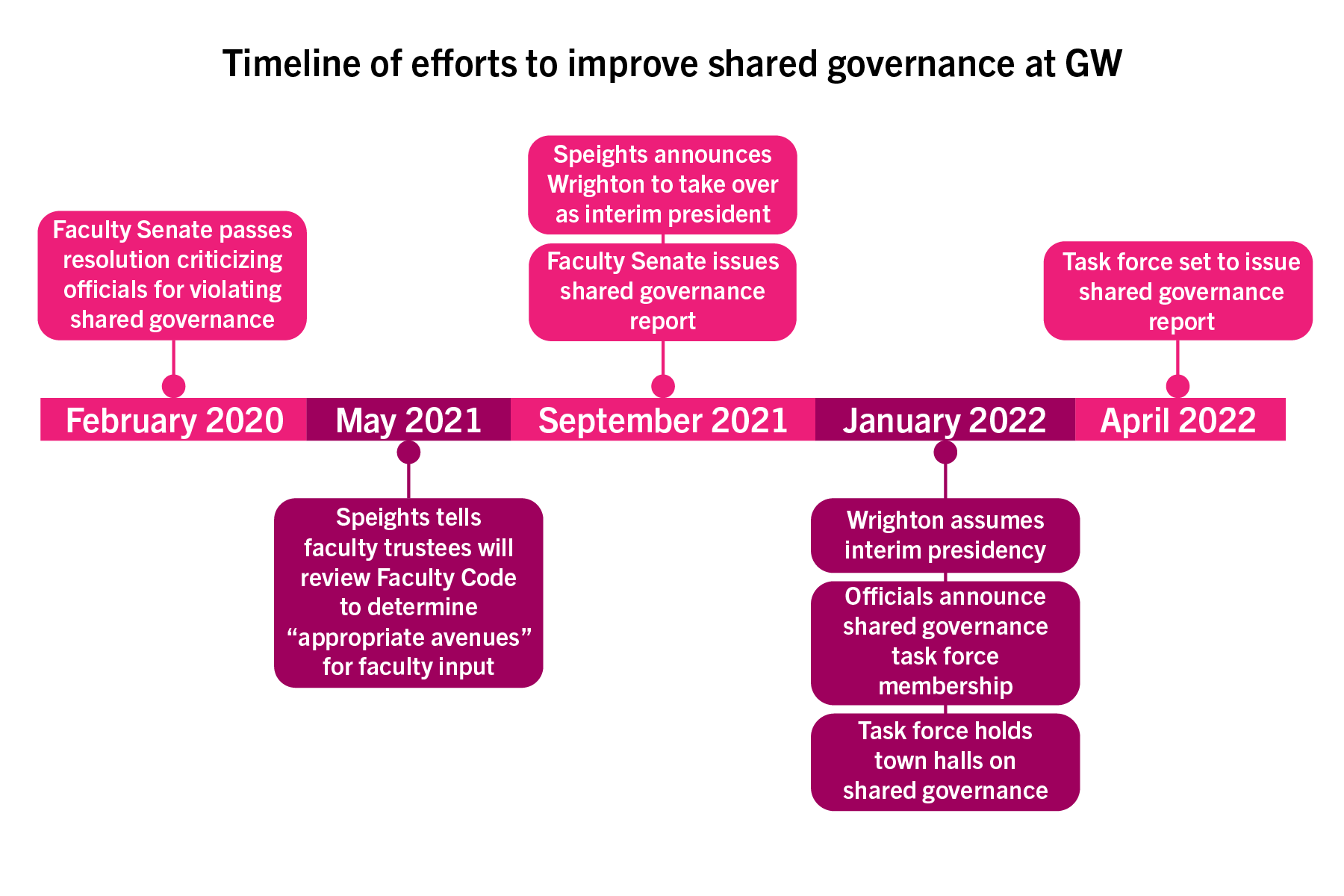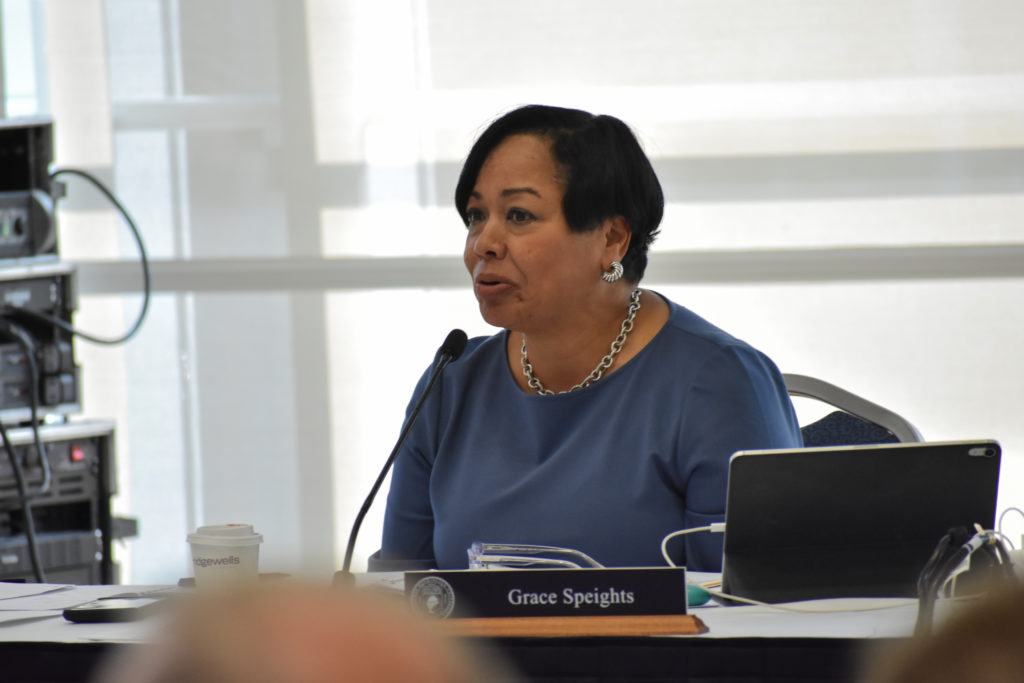Officials launched a survey to solicit feedback on shared governance from full-time faculty, administrators and the Board of Trustees Thursday as part of broader efforts to develop recommendations to enhance shared governance at GW this spring.
Efforts to build trust between administrators and the rest of the GW community date back to the end of former University President Thomas LeBlanc’s tumultuous tenure, which was marked by faculty concerns that officials violated shared governance principles amid a proposed enrollment cut with little consultation from faculty. The survey is part of a multi-step process including a retreat with faculty, trustees and administrators to discuss the results of the survey and eventually deliver a set of recommendations to the Board in May on how to improve shared governance moving forward.
With officials ramping up their efforts to improve shared governance in the coming months, here’s what you should know:
Shared governance over the years
Faculty concerns about shared governance came to a head in February 2020 when the Faculty Senate passed a resolution criticizing officials for violating principles of shared governance amid a plan to cut enrollment that LeBlanc was spearheading at the time.
Board Chair Grace Speights sent an email to professors last May stating she had been “troubled” by some professors whose discourse had done more to “foment discord” than contribute to civil dialogue. Her email came the day after LeBlanc announced his departure following a year of rising tensions with faculty members.

Nicholas Anastacio | Graphics Editor
The Faculty Association, an independent group of professors who consistently opposed LeBlanc and administrators, referenced LeBlanc’s departure in several tweets after the announcement he would be stepping down, some containing vulgarities and memes.
LeBlanc’s tenure, which was largely overshadowed by the onset of the pandemic and growing distrust between him and the University community, culminated at the end of 2021 with interim University President Mark Wrighton’s arrival on campus.
Speights said at a senate meeting in September when she announced Wrighton would become interim president that there was “work to be done” to improve shared governance before installing a permanent leader for GW. Her remarks at the meeting marked officials’ first formal and public indication of the start to their efforts to improve shared governance at GW.
She said the GW community has seen a “problem” with shared governance in recent years and a lack of trust among the Faculty Senate, administrators and trustees. She and faculty senators also discussed a report on how to improve shared governance at the University at the meeting.
The report outlined a series of recommendations based on successful instances of shared governance in the past as a “starting point” for improving shared governance in the long term. The report cites officials’ efforts to modify the Faculty Code – which trustees approved in 2019 – as an example of successful shared governance.
Speights said at the September senate meeting that the Board met with consultants from the Association of Governing Boards of Colleges and Universities and the American Association of University Professors this summer to discuss how GW should approach shared governance reforms.
“There’s also been an issue of lack of transparency, and we understand that, and we have heard you,” Speights said at the meeting. “The Board spent a lot of time over the summer thinking about the issue of shared governance and how we could move forward together – the three constituents – to make this an even better University, and the Board, I can tell you, is committed to doing that.”
Defining shared governance this spring
Officials outlined their plan to improve shared governance at GW in October, including a series of town hall meetings, a survey and a retreat to ultimately develop a set of recommendations for Board approval in May. They announced in January the makeup of a shared governance task force that has been overseeing officials’ broader efforts this semester.
The task force also hosted a series of town halls last month, where faculty called for increased dialogue and collaboration among faculty, administrators and trustees. Officials said the task force would use the results of the town halls to create the survey they released to the three groups last week.
The survey is anonymous and will be open for two weeks, according to the task force’s website. The group will use the survey to identify ways to improve communication among those involved in shared governance and with the faculty as a whole, the website states.
Perspective from leadership
The shared governance task force is made up of trustees, faculty and administrators, each with four members.
Interim Provost Chris Bracey, one of the task force’s co-chairs, Senior Vice Provost Terry Murphy, Columbian College of Arts and Sciences Dean Paul Wahlbeck and interim Deputy General Counsel Richard Weitzner make up the administration membership on the task force.
The faculty on the task force include Christine Pintz, a professor of nursing, and Shaista Khilji, a task force co-chair and professor of human and organizational learning and international affairs. Joe Cordes, a professor of economics and public policy and public administration, and Arthur Wilson, the chair of the senate’s executive committee and an associate professor of finance, also represent faculty on the task force.
Trustees Amr ElSawy, a task force co-chair, Mark Chichester, Madeleine Jacobs and Todd Klein also serve as members.
Cordes declined to comment on behalf of the task force and deferred to Wrighton. Board Chair Speights, who initiated discussion on shared governance last year, did not return a request for comment.
University spokesperson Crystal Nosal declined to share a copy of the shared governance survey and say how many faculty members filled out a feedback form after the town hall meetings last month.
Wrighton, who attended the town hall meetings last month, said in a January interview that he is working with “key members” of the shared governance task force regularly.
“I’m going to be very actively involved,” Wrighton said. “The Board of Trustees recognizes that the president – who is, by the way, a member of the Board and delegated to be responsible for the administration and operations of the University – I will play an important role as will any president.”











